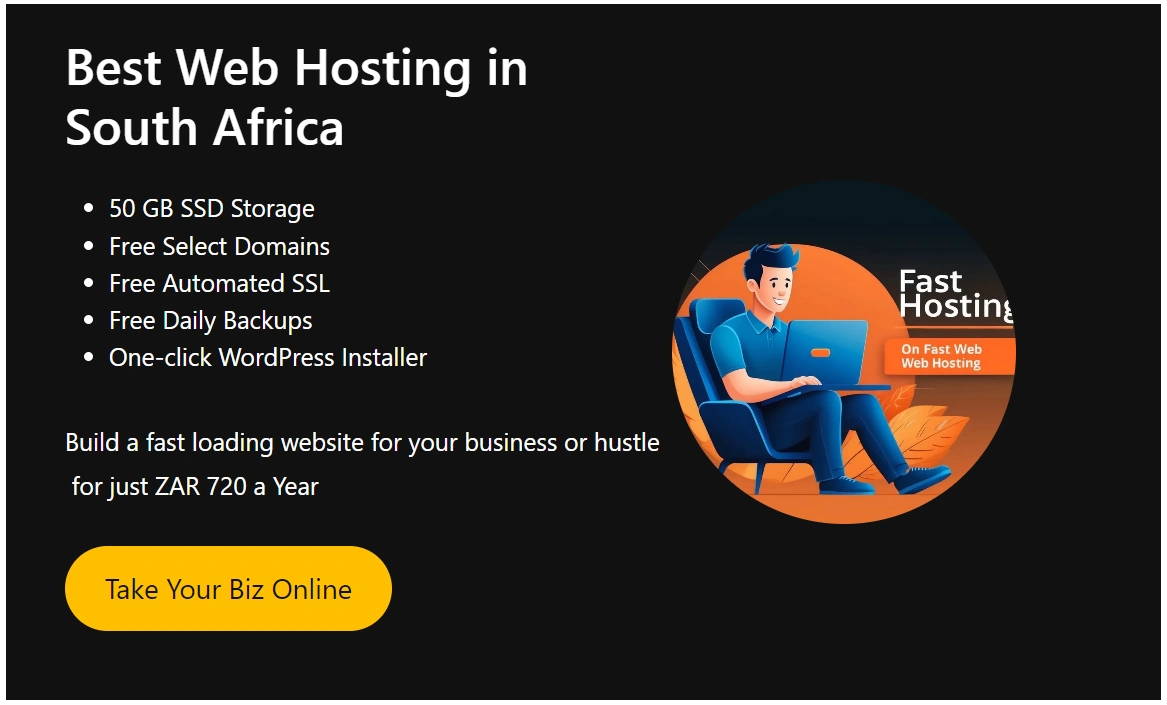What is web hosting?
Web hosting is an online service that makes it possible for internet users to access your website’s content. Purchasing a hosting plan is like renting a house but in this case you rent a physical server which will be used to store your website files and data.
Web hosting companies provide the hosting technology and resources required for the effective and secure operation of a website. They are also responsible for keeping the server up and running, implementing security measures, and ensuring that data such as texts, photos, and other files are successfully transferred to the visitors’ browsers.
In this article, you will learn what web hosting is, types of web hosting and how web hosting works in Zimbabwe.
Why do you need web hosting for a website?
Web hosting allows you to have your website on the internet. Without it, it can be difficult and expensive to host your website.
As mentioned earlier, web hosting provides you with a space to store your website’s files. Once you create your website, you will need a space to store your files and images that make up your website. The space that you need is on a web server that is provided by a web hosting company.
Their services give you access to certain tools and services that can make creating and managing your website easier. For instant, most web hosting companies offer website builder services, which allow you to create a website without any programming or design skills.
Other web hosting companies also offer tools such as email services and databases that help manage your websites.
Types of web hosting:
There are various types of web hosting services which include shared hosting, virtual private server (VPS) hosting, dedicated hosting, WordPress hosting and cloud hosting. Each type of these hosting services offers different features and benefits that can be beneficial for your website.
Shared hosting
This is the most popular type of web hosting service where your website shares a server with other websites. This means that you share resources such as bandwidth and storage space with other websites.
VPS hosting
A virtual private server (VPS) is a type of web hosting that allows you to have your server. VPS hosting allottes you a certain amount of resources, such as bandwidth and storage space. These web hosting is a great option for businesses and websites that require more resources than what is offered in a shared hosting.
Dedicated hosting
Dedicated hosting is a type of web hosting service in which you get your own server. With dedicated hosting, you don’t share your server with other websites. It allows you to have more control over your server and the resources that are available to you. Dedicated hosting is perfect for businesses and websites that require a lot of resources.
Cloud hosting
Cloud hosting allows you to have your website hosted on multiple servers. With this web hosting, your website will be able to scale up or down as needed.
This simply means that you can have the resources that you need when you need them. Cloud hosting is a perfect option for businesses or websites that have fluctuating resource needs.
Comparison of different types of web hosting
Shared hosting vs dedicated hosting
In both shared and dedicated hosting, website data is held on a single server. However, the type of server a website is hosted on is different in both.
In shared hosting your website shares a server with other websites while in dedicated hosting you have a server for your site only. Although dedicated hosting sounds better, they both have their pros and cons.
Shared hosting vs VPS hosting
Shared hosting is less expensive as compared to VPS hosting, since you share one server with other websites. With shared hosting you get a limited number of resources but you can maintain a small website without spending too much money. VPS hosting, On the other hand, VPS hosting provides greater freedom and performance at a higher cost.
Shared hosting vs Cloud hosting
Cloud hosting is much more powerful than shared hosting since you get a whole server all by yourself and you don’t share its resources with any other website.
Choosing a Web Hosting Provider in Zimbabwe
Popular web hosting providers in Zimbabwe
1. Ecowebzim Solutions
Ecowebzim solutions offers dependable web hosting with its budget hosting plans start at $1.25 2GB, shared hosting plans start at $2.50 5GB, per month, which includes free weekly backups and enough bandwidth for your site visitors.
2. GetHost Zimbabwe
GetHost is among the most popular web hosting companies in Zimbabwe, especially among those launching their WordPress websites. The company offers great rates and a beginner-friendly platform that makes every aspect of running a WordPress website easy. You can also build other types of websites on Gethost.
GetHost’s Basic shared hosting plan is usually $2.43 2GB per month, plus but major discounts for new customers. In addition to that, they offer free domain & lifetime SSL included with a 1-year subscription.
3. Webdev Solutions
Webdev (Pvt) Ltd is among the leading web host providers in Zimbabwe. WebDev is a great option for WordPress hosting, Email Hosting and VPS solutions. However, their pricing structure may take you a couple of minutes to actual understand the fees accordingly and what you will be paying for.
4. Tremhost
Just like any other web host provider, Tremhost provides an automatic 1-Click WordPress Installer and auto-updates to keep your WordPress site up to date. The company offers fast speeds, solid uptime, and great solutions for WordPress Hosting, Reseller Web Hosting, and Virtual Private Servers.
5. ZimHero
ZimHero which is a web host provider in Zimbabwe offers virtual private servers (VPS), Email Hosting, and affordable domain registrations. The web host company has a great loading speed which makes it stand out from the rest.
6. Wimasco
Wimasco was named as one of the best Website Hosting and Domain Name Registration companies in 2022. The company is also known for providing excellent services to its customers every year.
All plans in Wimasco offer unlimited emails, a free domain for a year, daily backups, multi-user access, and free SSL.
Criteria for choosing a web hosting provider:
Cost
When choosing a web host you need about the signup cost and the renewal cost. What you pay initially for a plan might not be what you will pay during renewal. In most cases the renewal price is higher depending on how many offers/discounts you were given at the start.
Most hosting companies have made it a norm to hike up renewal price and at this point there is no way to avoid it. However, it is advisable to go for web hosts that are reasonable with their price jummps. For instance if you sign up at $5 per month then the price should not go above $10 per month when you renew.
Reliability
If your site goes down for just 30 minutes, you might loose alot of money from that. All your potential customers will help up making purchases somewhere else in those 30 minutes.
Staying online is very important for your website and in order to do that, you need to ensure you choose a stable web hosting provider. There are several server monitoring tools that you can use to track a web host but generally, looking at their uptime scores is more than enough to tell whether a web host is stable or not.
The industry standard today at 99.95% uptime and any web host a uptime score below 99% should be avoided.
Backups
Even with all the security measures in the world, you will still need backups. At some point, your website will face some kind of crash, failure, virus, or hack that will take your website down, or worse, nuke it entirely and that where backups come in.
A great web host provider will be able to restore your full site or a big part of it with very minimal downtime to avoid any significant losses.
Comparison of different web hosting providers in Zimbabwe
Below is a comparison of their most popular plans
| Web Host Provider | Their Most Popular Plan | Price | Features |
|---|---|---|---|
| Ecowebzim Solutions | Power Plan | $ 4.00/m | 10GB Web Space, 50 Email Accounts, 10 Subdomains, 10+ Databases, Host 3 Websites, FREE SSL Certificate |
| GetHost | Get Silver | $ 4.99/m | 5 Website, 20GB SSD Disk Space, Unmetered Bandwidth, 50 Databases, 50 Email Accounts, Free SSL Certificate, Weekly Backups, 99.9% Uptime Guarantee |
| Webdev | SME Web Hosting | $3.33/m | Free domain & SSL, WordPress +400apps, 2.5GB to 40GB SSD, 5 – 100 Email accounts. |
| Tremhost | Budget Plan 1 | $10/year | 250 MB Storage Space,1 GB Monthly Bandwidth, 1 Sub-domains, 1 Email Accounts, 1 Database, 1 Parked Domains, 1 Addon Domains, 24/7 Customer Support, WordPress Installation, WordPress Support, Free SSL |
| ZimHero | Premium | $4.20/m | Cloud Hosting For 6 Websites, Unlimited GB Bandwidth Storage,Unlimited Email Addresses,Unlimited MySQL database, Free cPanel, Free & Auto SSL, Free LiteSpeed w/Speed Boost,Free Auto Nightly Backups,Free Website Builder,99.9 Uptime Commitment |
| Wimasco | Infinity | $ 3.99 | 10GB NVMe Storage, 1 Core | 1GB RAM, Daily Backups, 1-click install of over 150 free apps, Free SSL Certificates, Unlimited Email Accounts, WordPress Optimised |
Steps involved in setting up a website on a web hosting account
#1 Choose Your preferred type of web hosting
Web hosting comes in different shapes and sizes but normally web hosting falls into any of the mentioned categories which are shared hosting, VPS hosting, cloud hosting, and dedicated hosting as discussed earlier in this article.
Majority of new websites prefer a shared hosting plan. However, you can consider VPS or Cloud hosting plans if you are confident that you will get a lot of traffic right away.
#2 Choose a Web Hosting Provider
There are thousands of options out there but you need to find the right fit for you. The provider you go for should have the hosting type you want at a price that fits your budget.
However, you need to be abit flexible in that you can spend a few extra dollars if you find a provider who is a bit higher but offering everything you need.
A great web hosting provider will provide a solid firewall protection, data backup, domain name registration, technical support, email services, and website building tools and applications.
#3 Choose a Hosting Plan
After choosing your host, you need a plan within the hosting type you want. All web hosting providers have a pricing page showing the differences between plans within a category.
Depending on the provider hosting type, each plan can tell how much monthly traffic it can accommodate. If you are starting a small or personal blog, it is advisable to go for shared hosting plan. You can later upgrade as your site grows.
#4 Register Your Domain Name
Normally, it’s advisable to keep domain registration and web hosting separate. But if you’re using a reputable hosting provider, you can register your domain through the same platform to get everything you need under one roof.
How to register a domain name
a). Choose a domain name
Choose a domain name similar to your brand to make it more memorable.
b). Check for domain availability
It will take you just a couple seconds to check domain availability. Almost every registrar and hosting provider has a free domain name search tool that allows you to do this (via a record system called WHOIS and RDAP).
c). Choose a domain name registrar
A registrar company reserves and registers domain names on your behalf. When you purchase a domain name, either directly from a registrar or through a web-hosting service, it’s registered to the DNS on your behalf.
d). Purchase and register your domain name
Domain names are paid annually on a recurring basis. Be mindful of the difference between the starting price and the renewal price when considering the cost of your domain.
If you already have a domain then you will just enter your existing domain and follow the prompts to set up the domain with your hosting provider.
If you haven’t settled on a domain just yet, skip this step and come back to it later.
#5 Configure Your Package Options
The Last step of hosting a website is finalizing your contract with your web hosting provider. If you want to get the lowest rates possible, you will need to pay for a few years in advance. It’s standard practice in the web hosting industry for rates to increase after your initial contract, so choosing the longest possible plan term will help you save money in the future.
Every web hosting provider will hit you with some upsells after choosing a plan. Although you can just ignore some of them,there are others you should definitely take advantage of.
Explanation of how to manage web hosting account and website
Updating website
Updating your website is important for several reasons. The most well known reasons for updating a website is to increase website security and prevent hacking, but there are other reasons such as helping your internet marketing strategy and increasing traffic to your website. Due to this it is advisable for businesses to update their websites regularly.
Backing up data
Backups protect your website against human errors, hardware failure, virus attacks, power failure, and natural disasters. Backups can help you save time and money if these failures occur.
Security of Website on a Web Hosting Platform
Businesses and organizations should use a website framework that is secure. A platform without a strong development community behind it, can lead to your website being hacked without your knowledge.
Importance of securing website from potential threats
a). Protect your Assets
By securing your website, you are protecting your physical equipment. Hackers can install viruses on your website that could impact your physical machines.
Think of the high costs of having viruses that cripple your systems and having to hire an expert to remove the viruses from your machines or being forced to replace the machines if the damage is irreversible.
b). Hacks Keep Going Up
Websites are hacked every single day. The number of sites being hacked in a day is between 30,000 to 50,000. However, there are hundreds of thousands of attacks that are successfully prevented and shut down before any damage is done.
This means you don’t have to be scared of operating online. Although hacking is a very strong risk, it can be mitigated with the right technology and strategies.
c). Protect your Customers Personal Information
Most people now more than ever depend on websites for the products and services they use on a daily basis. Customers may provide you with their names, credit card details, email addresses and home addresses which is a goldmine for hackers who are after sensitive information.
It is therefore important to encrypt their information before it is sent anywhere and to also take internal measures to safeguard the data.
Malicious software is used to infect websites, gather data and sometimes even hijack computer resources. A site where an attacker has gained access can be used to redirect traffic and infect visitors with malicious software, which means if your site is not prtected, hackers can use your site to infect your site visitors with malware.
d). Prevent a loss in Revenue
If your site is hacked that can lead to massive amounts of downtime and loss of productivity. That translates into sales that you could be missing out on.
Unprotected website threatens not only the security of the company but it existence too since loss of too many sales could result in the business having to close its doors for good. If your site is hacked and maybe added to different blacklist, your customers will nolonger be able to reach your products or services which means no sales.
Support from Web Hosting Providers
a). Online resources
Most web hosting companies offer online support resources such as knowledge base section which is full of articles, guides, how-tos, instructions, and answers to clients most frequently asked questions.
b). Customer service options
Web hosting providers also offer several customer service options such as live chats, email address through which you can get help and phone calls through which you can get intouch with their support team.
 Web Hosting
Web Hosting Windows HostingBuilt for Windows apps and websites – stability, speed and flexibility
Windows HostingBuilt for Windows apps and websites – stability, speed and flexibility Reseller HostingLaunch a hosting business without technical skills or expensive infrastructure
Reseller HostingLaunch a hosting business without technical skills or expensive infrastructure Affiliate ProgramRefer customers and earn commissions from sales across our platform
Affiliate ProgramRefer customers and earn commissions from sales across our platform Domain SearchFind and secure a domain name in seconds with our quick lookup tool
Domain SearchFind and secure a domain name in seconds with our quick lookup tool CO ZA Domains
CO ZA Domains All DomainsExplore domain names from over 324 TLDs globally – all in one place
All DomainsExplore domain names from over 324 TLDs globally – all in one place Whois
Whois VPS
VPS SSLs
SSLs









